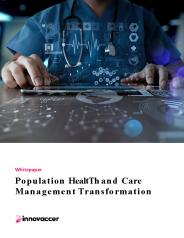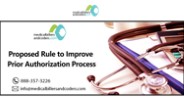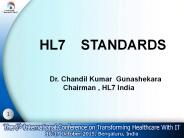Fhir For Payers PowerPoint PPT Presentations
All Time
Recommended
FHIR is the forefront standard for sharing healthcare information in a safe and secure way. Here are the advantages and Challenges of FHIR for payers.
| PowerPoint PPT presentation | free to download
FHIR-The most famous new standard in healthcare industry to convey value-added health information exchange. Checkout the role of FHIR in 2021 healthcare delivery.
| PowerPoint PPT presentation | free to download
FHIR makes a norm for sharing and exchanging clinical records in a viable manner. Here are the 7 proven reasons that gives you why FHIR is better. https://www.capminds.com/blog/7-proven-reasons-that-shows-you-why-fhir-is-better/
| PowerPoint PPT presentation | free to download
Healthcare organizations require sophisticated tools for efficient and scalable population health management. Tools that offer technological finesse to make a significant impact on population health and care management better fit a modern healthcare organization’s unique environment. Learn how Innovaccer’s solutions powered by their FHIR-enabled Data Activation Platform are transforming population health and care management.
| PowerPoint PPT presentation | free to download
On 6th Dec 2022, the CMS proposed a rule that would increase patient and provider access to health information and streamline procedures to improve prior authorization process for medical items and services.
| PowerPoint PPT presentation | free to download
Explains about how to Enhance knowledge transfer among all of stakeholders including healthcare providers. For more information visit: http://www.transformhealth-it.org/
| PowerPoint PPT presentation | free to download
Post-operative care involves the care received after a surgical procedure and often includes pain management and wound care as part of the healing process. It may continue even after the patient’s discharge, therefore, it is imperative for the provider to teach the patient about the potential side effects and complications of the procedure. In this entire process, the information around the patient’s medical history plays a crucial role in facilitating healing and eliminating risks. Surgeries are generally elective instead of emergent, and for patients with severe illnesses or pre-existing conditions, it requires a different approach to care as per patient characteristics.
| PowerPoint PPT presentation | free to download
The healthcare sector embraces continuous transformation, technological advancements in healthcare are redefining patient care, diagnostics, and operational workflows. With the rise of emerging technologies in healthcare, companies are racing to build innovative solutions that address patient needs while enhancing the efficiency of healthcare providers.
| PowerPoint PPT presentation | free to download
According to the latest research report by IMARC Group, The global healthcare interoperability solutions market size reached US$ 3.9 Billion in 2023. Looking forward, IMARC Group expects the market to reach US$ 11.0 Billion by 2032, exhibiting a growth rate (CAGR) of 12.24% during 2024-2032. More Info:- https://www.imarcgroup.com/healthcare-interoperability-solutions-market
| PowerPoint PPT presentation | free to download
Post-operative care involves the care received after a surgical procedure and often includes pain management and wound care as part of the healing process. It may continue even after the patient’s discharge, therefore, it is imperative for the provider to teach the patient about the potential side effects and complications of the procedure. In this entire process, the information around the patient’s medical history plays a crucial role in facilitating healing and eliminating risks. Surgeries are generally elective instead of emergent, and for patients with severe illnesses or pre-existing conditions, it requires a different approach to care as per patient characteristics.
| PowerPoint PPT presentation | free to download
Managing relationships over time and across organizations is better for patients and clinicians, and helps increase efficiency
| PowerPoint PPT presentation | free to download
Healthcare organizations require sophisticated tools for efficient and scalable population health management.
| PowerPoint PPT presentation | free to download












